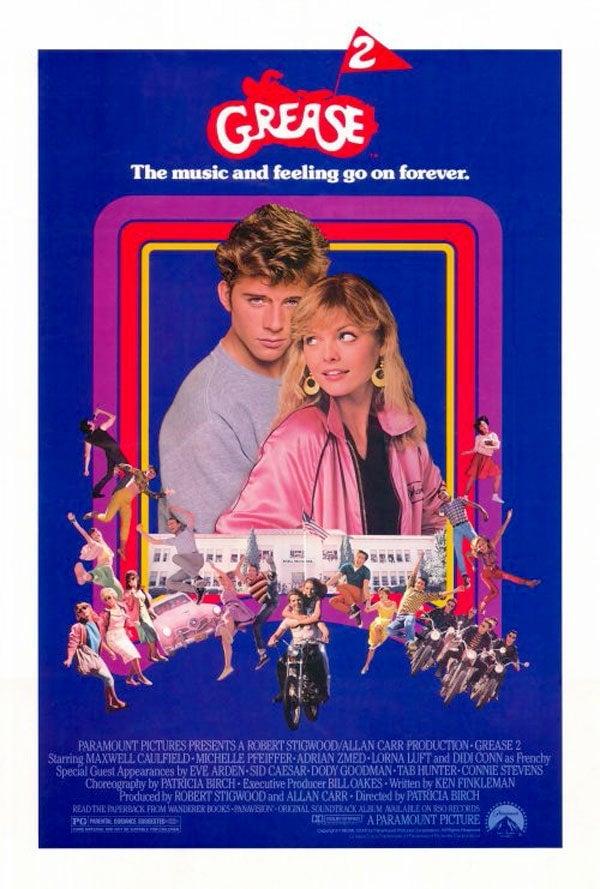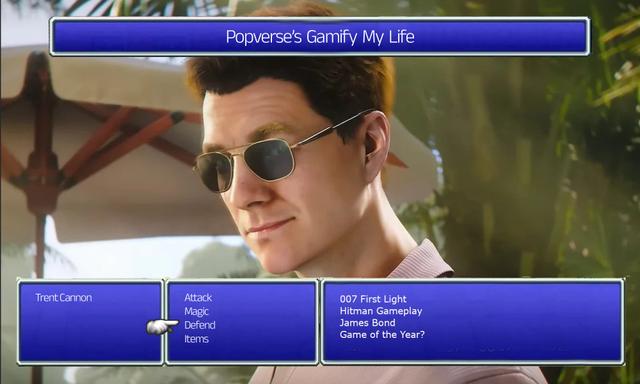If you click on a link and make a purchase we may receive a small commission. Read our editorial policy.
The hokey joys of Michelle Pfeiffer in Grease 2
Revisiting Grease 2, 40 years after its release

I can't imagine what it was like waiting for the follow up to one of the '70s biggest hits Grease, only to show up to the theater and have to sit through Grease 2. But sometimes, it just takes time (let's say, 40 years?) to enjoy a flop.

I know. It's easy to make fun of the movie so bad that it made Paramount Pictures scrap Grease's many other planned sequels and spinoffs, and yes, the movie is awful. But the important part of loving Grease 2 is understanding what it is and what it is not. It's not a 'good' movie by any standards, but it is definitely worth watching at least once (Come on! You know you want to!). Before we get to the reasons (or reason) why Grease 2 is great, we should first acknowledge why it is a complete and utter disaster.
Grease 2 completely misses the point of why Grease was popular, skipping over the underlying anxiety around teens and changing times and replacing it with quasi-'60s imagery and surface-level references to sex. There's no tension in the surprisingly bland romance between Maxwell Caulfield and Michelle Pfeiffer. None of the cliques make any sense (Pfeiffer is supposed to be the Danny character, but there is still a Danny character running around and posturing in his T-Bird jacket), and the characters either stay one note throughout the film (sorry, Caulfield) or flip flop ten times during a scene (consider the characters in just the 'Reproduction' scene).
Speaking of the 'Reproduction' number, Grease 2 is somehow wildly horny (they sing and talk about sex, a lot) and completely sexless at the same time. Instead of being tongue in cheek, the movie is goofy— consider the clever double entendre of the bowling song, "We're gonna score tonight." It also doesn't help that the movie is shot bizzarely, as if it were constantly trying to cram as many people into every single shot possible.

But, as a fan of terrible movies, I must say I'm fond of the caricatures of characters in Grease 2. And if you listen to them enough, some of those songs can start to get catchy ('Prowlin' is great, don't @ me). A surprising amount of the humor lands, and a couple of the side plots almost work. But there is only one part of the movie that actually, really works. Because all of that mess, the lack of cohesion, and lifeless dialogue, is worth it for Michelle Pfeiffer.
Michelle Pfeiffer makes her Hollywood debut in Grease 2, and everything about her character Stephanie Zinone, from her red bowling shirt to her weird sunglasses, is iconic. Unlike most of the other actors (though who could blame them with that script?), she always finds a way to make her character make sense, even in non-sensical scenes. Where her character shouldn't be dancing, she dances— with attitude. She struts around chewing gum and throwing her hair around in a way that makes her naive acting seem compelling. Throughout the movie, she wears a smile like she knows she's better than everyone else, like she's on a completely different plane of existence.

Of course, the most important moment Michelle Pfeiffer moment of Grease 2, as any Grease 2 aficionado will tell you, is 'Cool Rider,' which has got to be one of the most iconic on-screen experiences of 1982 (yes, I know E.T. came out that year). Pfeiffer, like many actors in this movie, acts with a lot of hair tossing, and she really depends a lot on her wide-eyed look. The framing of the camera doesn't really help her either, but even with all of that, you can already tell that she's got something special about her.
'Cool Rider' is about Pfeiffer's character Stephanie wanting more than the guys that she's expected to get with. She wants a "cool rider," a man of mystery with "hell in his eyes." The impetus of the song is her response to Michael (Caulfield's character) about why she refuses to go out with him, but she's mostly singing to herself. In that way, it's not a song about love or even a guy. It's a song about what she deserves and what she's willing to wait for.

It's not an exaggeration to say that Michelle Pfeiffer is a queer icon (ask any queer person about Catwoman, but be prepared to talk for a while), but this song is kind of a great queer moment. She's talking about wanting more, something beyond what has been handed to her. Something that she's not supposed to want.
It's also a total banger.
In the scene, Pfeiffer manages to sexily climb up a ladder, sexily dance with a large cardboard wheel, and sexily dance her way out of a room on her own, just singing to herself. It's bizarre, because it kind of looks like a high schooler filmed it in a free period, but it still feels electric, because Pfeiffer is electric.
The thing about Michelle Pfeiffer's performance in Grease 2 is that it's not just about her looks— Maxwell Caulfield has looks, but he doesn't have the charisma. He just broods (albeit handsomely) throughout the movie. Pfeiffer has a style, an assuredness to her. She looks silly from time to time, but she's never sillier than the movie is asking her to be. So in her big scene 'Cool Rider,'the movie looks bad, but she still looks good.
But is her performance itself actually any good? Well, it depends on what you consider good. Her acting is nowhere near what we see from her just a year later in Scarface. But she's immensely watchable, and she's wildly sexy, even when the movie is not. And in a movie that lacks general watchability, she is the saving grace. But Michelle Pfeiffer as Stephanie Zinone does more than make Grease 2 palatable. She transcends the messiness of the movie and becomes a style inspiration, an attitude icon-- and she's kept a below mediocre old movie alive and rewatchable for 40 years.
Speaking of icons, why not check out 'Diana & Me: a personal essay by Wonder Woman voice actor Susan Eisenberg'?
Follow Popverse for upcoming event coverage and news
Find out how we conduct our review by reading our review policy
Let Popverse be your tour guide through the wilderness of pop culture
Sign in and let us help you find your new favorite thing.
















Comments
Want to join the discussion? Please activate your account first.
Visit Reedpop ID if you need to resend the confirmation email.